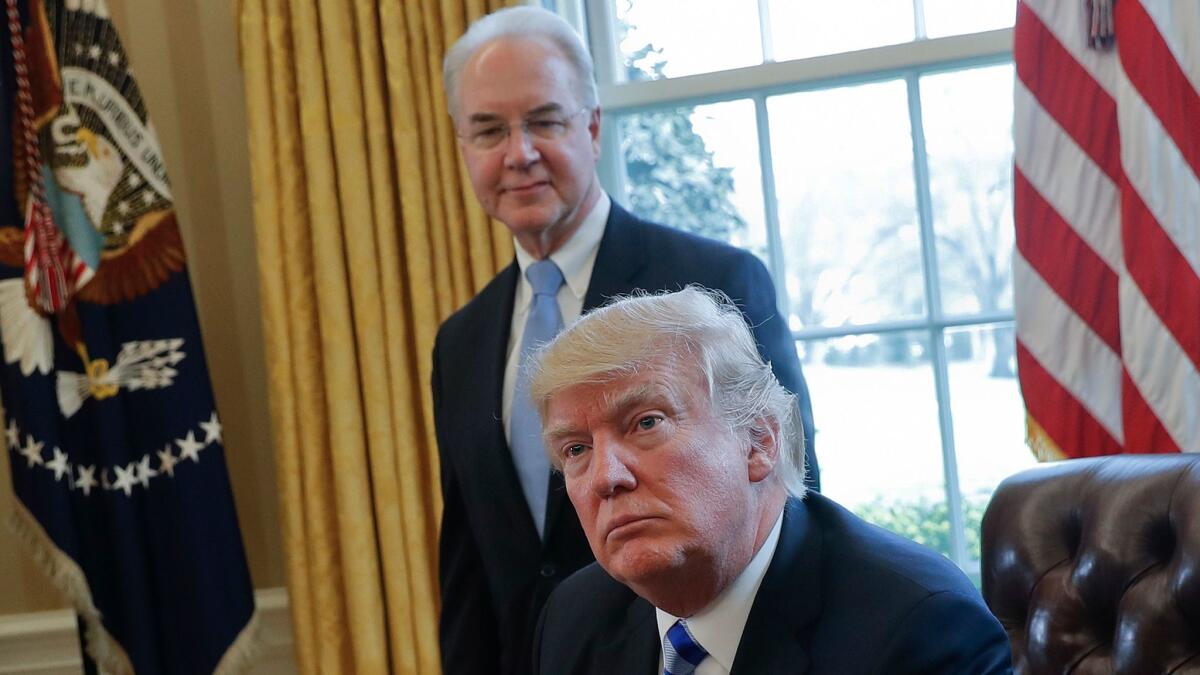Column: How Trump and the GOP are plotting to give big health insurers exactly what they want

The nation’s biggest health insurer, UnitedHealth Group, had a pretty good quarter, judging from the preening by its executives during a conference call with Wall Street analysts this week.
The company turned a profit of $2.2 billion on revenue of $48.7 billion for the quarter ended March 30. That was partially the result of the company’s bailing out entirely on Affordable Care Act individual insurance exchanges, on which it was losing money.
Executives from Chief Executive Stephen Hemsley on down shed crocodile tears on the “difficult decision” to abandon the ACA, but they weren’t shy about proposing changes to the law that they think will make it better. Interestingly, every change they mentioned would make the ACA work a lot better for UnitedHealth, though not for its customers.
This waiver is a pure wave-through. States can do what they want.
— Health reform commentator Andrew Sprung
Even more interestingly, everything they mentioned has been made part of the Obamacare repeal package proposed by House Republicans and endorsed by President Trump. That includes the latest tweak, announced just this week, which would allow states effectively to eliminate protections for people with preexisting medical conditions. If you want to know why the Republicans are so assiduously pushing a package that’s universally detested by members of the public, this may give you a clue: The big money is in favor.
Put simply, the GOP proposal is what health insurance policy would look like if it was written by people like Hemsley, who collected more than $41 million in pay from 2013 through 2015.
As we write, the prospects for the latest version of Obamacare repeal in the House are uncertain. No one has seen a formal draft, and a vote hasn’t been scheduled. Still, the Republicans are under pressure from Trump to do something on the issue by his 100th day in office, the customary yardstick for a new administration’s accomplishments since Franklin Roosevelt’s first term. For Trump, that day is Saturday, April 29.
UnitedHealth’s prescriptions for the ACA provide a textbook case of how a big corporation can see a public program entirely as a profit-maximizer for itself. The company’s wish list was laid out by Hemsley and his team during the April 18 conference call. It can be found in greater detail in two manifestos appearing on the company’s website, to which its PR department referred me. They’re here and here.
The company is heavily in favor of Medicaid expansion, an ACA program from which it makes a ton of money — a profit margin of 3% to 5%, according to the conference call. It endorses expanding health savings accounts, which amount to a boon to the wealthy and a business in which UnitedHealth is a major player.
UnitedHealth advocates eliminating federally mandated essential health benefits and giving the states more authority to approve insurance plan designs. This would include “restoring short-term and limited coverage policies,” which were essentially outlawed by the ACA because so many of them proved to be overpriced junk insurance that left owners stranded when genuine medical needs cropped up.
UnitedHealth also proposes to “strengthen and grow” employer-sponsored insurance. UnitedHealth is a major player in this market, from which nearly half of all Americans get their health coverage. Healthcare experts, however, generally consider this system to be one of the major flaws in our healthcare system. Before the ACA, it’s what made millions of Americans vulnerable to losing their health insurance because they lost their job, and kept millions more locked into jobs they didn’t like or that kept them from quitting to start their own entrepreneurial enterprises.
The ACA began the process of decoupling healthcare from employment, a good thing. UnitedHealth, which profits from this outdated system, wants to expand it.
UnitedHealth’s big cause is permanent elimination of the ACA’s tax on health insurance companies, which was suspended for 2017 at a cost to the government of nearly $14 billion. The company says the tax, which helps to fund government subsidies for insurance buyers, drives up premiums. But the company must really be concerned that it couldn’t pass it all through to consumers, or it wouldn’t be so anxious to kill it. In any event, UnitedHealth doesn’t have any proposal for making up the tax revenues from other sources, so obviously it doesn’t care all that much about the subsidies that make policies on the individual exchanges affordable for middle- and working-class families.
As I reported earlier, the Republicans’ Obamacare repeal proposal would throw 24 million people in the individual market off their health insurance and drive up costs for millions more. Further negotiations made the package even worse, by including a proposal that would eviscerate consumer protections and all but eliminate the safeguards guaranteeing coverage for people with preexisting medical conditions. These features contributed to the collapse of the repeal effort in the House in March.
Since then, Trump has pressured the House Republicans to try again. During the most recent congressional recess, they came up with an additional provision they hope will please right-wingers and moderates in their caucus. This one would maintain the ACA’s list of 10 essential health benefits at the federal level, but allow states to apply for a “waiver” to amend the list and restore permission for medical underwriting — that is, rejecting or surcharging people with medical histories.
As I’ve reported many times, this effectively would return the health insurance market to the dire days before the ACA, when Americans could be refused coverage not only if they had had cancer, a heart condition or diabetes, but even a history of hay fever or hives. The 2011 guidelines from Blue Shield of California telling its underwriters when to jack up the premiums for applicants or reject them outright ran to 25 pages of fine print. Insurers kept lists of hobbies and occupations warranting rejection, such as pilots, meat packers, taxi drivers and scuba divers.
The new proposal, fashioned by moderate Rep. Tom MacArthur (R-N.J.) and Rep. Mark Meadows (R-N.C.), head of the right-wing Freedom Caucus, would allow states to obtain a waiver allowing them to pare the ACA’s 10 essential benefits and to charge people with preexisting conditions higher rates. Those buyers couldn’t be refused insurance, but obviously they could be priced out of the market, which is the same thing.
The prerequisites for getting the waiver, moreover, are very loose. Under the existing ACA, states can apply for “innovation waivers” starting this year, allowing them to tinker with the ACA rules only if they can show that the changes will “provide coverage that is at least as comprehensive and affordable” as that under the ACA and that they won’t result in anyone’s losing coverage.
The proposed new language requires only that the state “attest that the purpose of their requested waiver is to reduce premium costs, increase the number of persons with healthcare coverage, or advance another benefit to the public interest in the state.” Those are loopholes big enough to drive a careening ambulance through.
“This waiver is a pure wave-through,” writes health reform commentator Andrew Sprung. “States can do what they want.” Judging from the rhetoric in many Republican-led states, you can expect them to eliminate maternity benefits, allow excessive surcharges for a huge number of medical conditions, and allow the sale of policies that may not cover hospitalization or preventive care.
Over at UnitedHealth, the idea of giving states this kind of authority is all to the good.
The company praises “state-based Health Care Markets” by asserting that they’re “flexible and coherent” and “provide more choice,” and are “able to respond to the specific circumstances and needs of the State’s communities.”
Is that so? Let’s check this by examining a public program that is largely under states’ control: traditional Medicaid. The federal government provides 50% to 75% of the cost of this program, with higher percentages going to states with lower per-capita incomes. But the states have the option to set their own eligibility standards, so we can judge how well they do in meeting their residents’ “specific circumstances and needs.”
Some do OK, some do terribly. Some cover parents and non-parent adults earning up to 138% of the federal poverty level, which would be $16,643 in annual income for an individual; these are states that agreed to expand Medicaid under the ACA. Most non-expansion states don’t cover childless adults at all.
For parents, eligibility limits are all over the map. California and 28 other states cover parents with income up to 138% of the poverty line (that would be $28,180 for a family of three). In Florida, the cutoff is $6,738 for that three-person family. In Alabama and Texas, Medicaid eligibility stops at annual household income of $3,676. Raise your hand if you think that Alabama and Texas cover the needs of their needy residents as well as those other states. Anyone?
By the way, Alabama’s refusal to accept Medicaid expansion left 435,000 of its residents without health insurance and will mean giving up more than $14 billion in federal funding over 10 years.
I’ve raised the issue before of whether corporations in the healthcare field have a greater duty to their communities than just pocketing as much money as they can, much of it from public sources. UnitedHealth’s Hemsley plainly doesn’t see it that way. But that’s an argument in favor of playing hardball with companies that cherry-pick which public programs they’ll work with, and which they’ll shun.
Here’s a suggestion: If UnitedHealth wants to to play in the lucrative sandbox of Medicaid, it should be required also to participate in the ACA exchanges. It might not make as lavish a profit as it did this quarter, but by all indications it would still be in the black — the company said it expected to lose $500 million on the exchanges in 2016, a year in which it recorded $7 billion in profits. Its participation would help stabilize the exchanges so they actually could become profitable for all participating firms.
For all that congressional Republicans pay lip service to the need to stabilize the individual market so that its millions of enrollees aren’t left without affordable coverage, they’ve never even mentioned this option. Every proposal they’ve set forth would make the American healthcare system immeasurably worse for its users, though immeasurably more profitable for its insurers. Is that really the goal?
Keep up to date with Michael Hiltzik. Follow @hiltzikm on Twitter, see his Facebook page, or email michael.hiltzik@latimes.com.
Return to Michael Hiltzik’s blog.
MORE FROM MICHAEL HILTZIK:
The Bill O’Reilly case shows how much Fox News and UC Berkeley have (horrors!) in common
Lawsuit against stem cell clinic Stemgenex can move forward, judge rules
More to Read
Sign up for Essential California
The most important California stories and recommendations in your inbox every morning.
You may occasionally receive promotional content from the Los Angeles Times.









